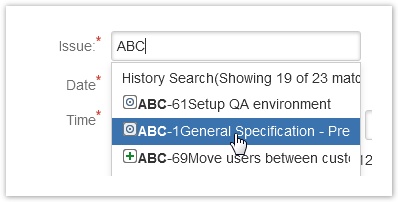...
| Info |
|---|
Apart from the places mentioned above (where you can open the "Log Work" dialogue), the log work option might also appear as part of other screens during workflow transitions. By default, this is the case e.g. for the "Resolve Issue" screen. See Custom Field Log Work Field for ictime for more information. |
Log Work (ictime) Screen
...
The following table describes all fields, including the ones that you already know from the JIRA default "Log Work" screen:
| Field | Description | Configurable | Remarks |
|---|---|---|---|
| User | Current user or user picker (if you respective permissions). |
| If you have the ictime permission "Log work for others" (see ictime Permissions), you can pick/change the user here and this way, can create work logs for other users. | ||
| Issue | Issue picker. If you are calling the "Log Work" screen from an issue (JIRA issue screen or JIRA Issue Navigator), the issue will be pre-populated. If you call the "Log Work" screen from the JIRA navigation, your timesheet etc., you will be required to select an issue first. To select/change an issue, start to type part of the issue description or key in the "Issue" field. The JIRA issue picker will return suggestions: |
| ||||
| Date | Date, shows today's date (and current time) for new work logs. |
You can change the date into the past or future, too. The field expects date & time (as this is the default in JIRA, JIRA writes a complete timestamp for the creation date/time into all work logs).
| ||||||
| Time | Log work/time as a time span/period "from-to" (start-end time). Use the icon to enter your current system time for "from" and "to". |
Available yes/no, see General Configuration. Force time tracking without overlapping work logs, see General Configuration. | You log e.g. from 12:34 to 14:56, and ictime calculates the |
resulting time spent for you (displayed as read-only field behind the time fields).
|
|
| |||||
| Time Spent | Log work/time as a result. This is the default way you log work in JIRA. | Available yes/no, see General Configuration. | e.g. as 12 or 12h, according to your JIRA time tracking configuration. You can find this configuration in JIRA under: Administration - System - Issue Features - Time Tracking (time estimates & default unit for time tracking) | ||
| Corrected Time Spent (Corrected Result) | You can enter a time value that is different from the "time spent" value or the calculated |
| time spent of logging work with a start and end time. | Available yes/no, see General Configuration. | Used to charge more or less time than the time that had been spent. In the summary of a report, the corrected |
time spent will be taken instead of "time spent" or the calculated |
time spent of logging work with a start and end time (see Reports: Summary & Analysis). Rounding rules (see Project Rounding Rule) are ignored in this case, the time value is taken exactly like entered by the user. | |||||
| Remaining Estimate | Various (JIRA) options to set or calculate the remaining estimate, if a work estimate has been done for the issue. | Available yes/no, see General Configuration. If "no", ictime will always calculate the remaining estimate automatically. If there is no original estimate, nothing will be done. | |||
| No Charge | Mark a work log as not to be charged and enter an optional comment/reason. | Available yes/no, see General Configuration. | In the summary of a report, the work log would be considered in the "No Charge" section of the report (see Reports: Summary & Analysis). An administrative user can change this setting when editing work logs, e.g. during the process of charing work logs in the Reporting section. See Reports: Work Log Details. | ||
| Activity | Choose an activity type to categorise your work. If activity types are activated in ictime (see Activity Types), this interface will offer the activity type dropdown. This dropdown will be empty as long as you did not select an issue, as the activity types available for this issue might depend on your project configuration in ictime (see Project Activity Types). | Available yes /no, see Activity Types and Project Activity Types |
| ||
| Work Description | Description of your work. |
| Mandatory. |
| Tip |
|---|
It is up to you whether you log work as a result ("time spent") or a time span ("from-to"). You can use both methods for the same issue and can also change this for a work log when editing or resuming a work log. If you switch from "span/period" to "resultTime Spent" and save, of course you will loose start and end time for this work log. If you switch from result "Time Spent" to "span/period", of course you will need to set a suitable start and end time. Logging work as time span has the following advantages:
|
...
| Note |
|---|
Work Log Attributes (Work Log Attributes (WLA)) are currently not properly supported when resuming work logs. |
...
Manage Work Logs (Edit & Delete)
...
If you are entering a start and end time for a work log ("from/to") and the result resulting time spent is not calculated, this can have two reasons.
...
First possible reason is that - like in the screenshot above - you have (accidentiallyaccidentally) entered an end time which is before the start time. In this case, of course there is not no result. You will get an error when trying to save.
...
For more information on date & time settings in JIRA, please refer to Time & Date Settings.


